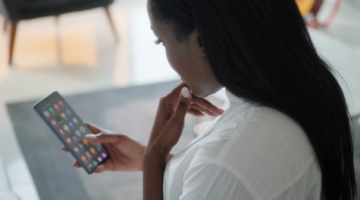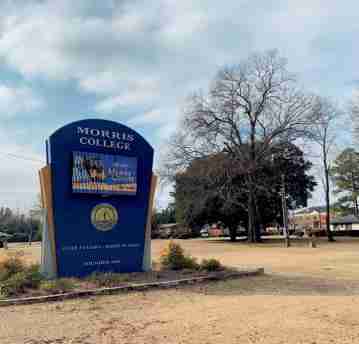Greenville, S.C. (AP) – Morris College in Sumter strives to provide quality education to its students and a culture of family.
Morris College is a private, Baptist college, which was founded and operated by the Baptist Educational and Missionary Convention of South Carolina in 1906 and then established in 1908.
The college received a certificate of incorporation from the state of South Carolina on April 12, 1911. Originally, Morris College provided schooling on the elementary, high school, and college levels. The college curriculum included programs in liberal arts, education for the certification of teachers, and a theological program.
In 1915, the Bachelor of Arts degree was granted for the first two graduates of the college. The institution discontinued its education for the certification of teachers program in 1929, its elementary school in 1930, and its high school in 1946.
The college then operated only as a junior college during the early 1930s, but resumed a full four-year program in 1933.
“FAMILY” CULTURE
For Morris College’s Student Government Association President Nigeria Myers, attending Morris gave her the opportunity to find herself.
Myers, a senior majoring in criminal justice with a minor in Christian education, said she decided to attend Morris because she wanted to be close to family and “didn’t want to be labeled as a statistic” – meaning, she feels treated like family at Morris.
She transferred from Greenville Technical College and said when she came to Morris it felt like it was a new season for her.
“I had lost myself in Greenville, and when I decided to come back (to Sumter), I knew I wanted to amount to something in life, and Morris gave me that opportunity and to unlock things within myself I didn’t know was there,” Myers said.
After she graduates, Myers plans to attend the University of South Carolina’s law school and eventually practice criminal, civil, and/or trust law.
“When I came to Morris, I always had aspiration in law,” said Myers. ” I knew I either wanted to become a cop or lawyer. Back in high school, I did ride-a-longs and was very intrigued by law from a young age. Others in my family have come to Morris, such as my grandfather who was a 1977 grad, and cousins who recently and currently have gone to Morris. In my immediate family, I will be the first one to graduate.”
Talique Cobb, junior and vice president of the Morris College Student Government Association, majors in mass communication and wants to become a social media marketer after he graduates, with aspirations to shift to politics and run for statewide office.
“I love the connection I have with faculty and staff, and they help me get through every day,” said Cobb. “When I was in high school, I really didn’t know what I wanted to do in life and realized I really like talking to people. I wondered what type of work I can do that would fit me. When I was a senior, I started learning about HBCUs that have mass communication degrees, but still wasn’t sure if college was for me.”
His mom really pushed him to try it out, Cobb said.
“Thinking back, I really appreciate my mom for guiding me,” he added. “She let me know my life is mine and is a big guidance in my life. She told me one way or another, I had to do something with my life.”
Tah’Ajaih Goodwine, senior and student leader first attendant of the Morris College Student Government Association has always had a passion for working with children, so she decided to major in early childhood education.
After she graduates, Goodwine would love to work as a preschool and kindergarten teacher for a few years, then work on getting her master’s and move up to an administrative role with a school district.
“My goal is to see kids succeed, and I never want to be the teacher who ever fails a child,” she said.
Goodwine’s grandparents also went to Morris, and her uncle went to another HBCU.
“I loved it (Morris) after I came to visit,” Goodwine said. “My senior year in high school, everyone was preparing for college. I was just going through life and didn’t realize the time to decide was coming as fast as it was. I took a step back and originally wanted to do speech pathology, but after observing an elementary school, being in the classroom, and teaching a lesson, from that moment I realized that’s what I wanted to do.” For Morris College junior Jeremiah Robinson, going to an HBCU had a different meaning to him because he is part of the minority.
“I applied for five out of seven HBCUs in South Carolina,” Robinson said. “I wasn’t too far from home but wasn’t too close either. Here, I would rather be 1 in 15 than 1 in 65. Here, you are family and people know you by name, and people never looked at me as an outcast. The opportunities are endless.”
Robinson majors in business administration and aspires to become a district manager or higher up at one of his favorite restaurants – Olive Garden.
People ask him if he regrets attending an HBCU, and the answer is no, Robinson said.
“All my professors are willing to help, and I will cry at graduation because I’ve always been treated like family here,” said Robinson. “College is about an internal growth experience, and I’m in the midst of it. Life is changing for the better, you just have to take advantage of it.” FAST FACTS
The college’s enrollment has been affected by the COVID-19 pandemic, according to the Morris College Dean of Academic Affairs Jacob E. Butler.
In the last few years, the enrollment has been between 500 and 600 students compared to around 1,000 prior to the pandemic.
“We are hoping the pandemic will subside and students who have suspended enrollment will re-enroll soon,” said Butler.
The college has expanded remote offerings to allow more students to take courses online, Butler said, but that form of learning doesn’t work for all students. The transition to remote learning can also be costly, Butler said.
“Now, we are part of the educational landscape and trying to balance the scale to figure out how many students to accommodate with virtual learning and what percentage of those students will be face-to-face or online,” he added. “We are still trying to navigate through all that. The pandemic has afforded us a means to look at what we do and how we do it and reassess everything.”
Butler said Morris is for the students contemplating college, especially first-generation students.
“We pride ourselves on providing the education you need in a smaller, more intimate setting with the capability to develop strong relationships with more personal attention,” said Butler. “At the same time, the student we educate and graduate go into the world and have a substantial impact.”
A lot of Morris students live within three counties of the college, so they can go home on the weekends and maintain any family obligations while going to school, he added.
Students who may need a little more support academically when first attending college are another reason why students look at schools like Morris, Butler said.
“I’m a product of an HBCU and I never thought I would be given the opportunity to give back to an HBCU through employment,” said Juana Davis-Freeman, Morris College dean of student affairs. “I’d like to think of my 23 years in working at Morris that I have made a difference in students’ lives. We meet students where they are and get them to where they want to be.” Another big part of Morris College’s student life is its Greek Life, said Davis-Freeman.
“UNIQUE POSITION”
Presently, the college offers programs of study leading to the baccalaureate degree with major programs in Biology, Biology/Secondary Education, Business Administration, Christian Education, Criminal Forensics, Criminal Justice, Cybersecurity, Early Childhood Education, Elementary Education, English, English/Secondary Education, Health Science, Liberal Studies, Mass Communications, Mathematics, Mathematics/Secondary Education, Organizational Management, Pastoral Ministry, Recreation Administration, Social Studies/Secondary Education, and Sociology.
Morris is ranked first in the state for its theology and religion programs and also well-known for its criminal justice program.
Morris College achieved the goal of full accreditation by the Commission on College of the Southern Association of Colleges and Schools on Dec. 13, 1978.
On Jan. 1, 1982, Morris College became the 42nd member of the United Negro College Fund, the nation’s largest and most successful black fund-raising organization.













No Comment